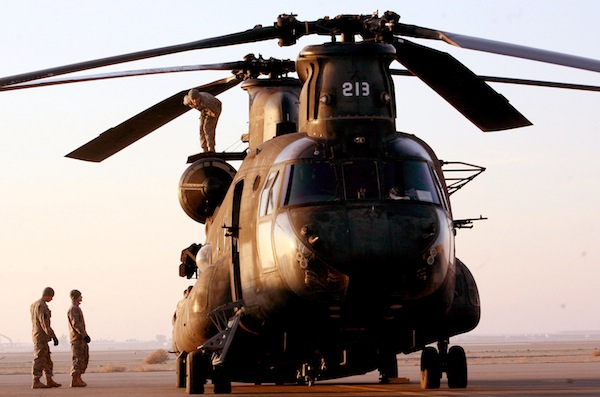
Photo by: Department of Defense
A Pentagon photo from 2010, as the U.S. occupation of Iraq was winding down.
By all rights, a different byline should appear on this post, but the writer has said that would be risky. The writer assisted American journalists during the U.S. war, then escaped to New York in 2006, but left family behind. Persistent violence has prevented a visit home. Bureaucracy appears to have stymied efforts to bring the family here. Now the Islamic State of Iraq and Syria introduces a new dimension of distance and fear, rendering any cooperation—past or present—with American media perilous. Here is what our friend writes:
I am an Iraqi American. My family still lives in Baghdad. None of my extended family members knew what I did for a living in Iraq, or that I married an American citizen. …
With ISIS targeting civilians left and right, I am very concerned that my family would be targeted for association with the U.S. government and marriage to a Christian.
After my marriage, which most people in Iraq would receive as invalid and allow many to consider it as an apostacy, my older brother was put in a position to “wash the family’s shame,” which means to look for and kill me. He escaped Iraq and applied for resettlement in the U.S. and arrived in New York City in 2010. In the meantime, I lost my brother-in-law in a bombing when a suicide bomber sat next to him in a funeral of the former’s friend and detonated himself. My sister came to visit me in NYC after she was devastated and sad, scared. She also applied for refugee status and was accepted in 2011.
The rest of my family in Iraq were: a mother suffering from severe asthma, a father fighting cancer, a brother struggling with advanced from of epilepsy, and another brother suffering from depression as he was left caring for the family alone. At that time, there was news coming from Iraq about losing many other family members including my uncle, cousins, an aged aunt, husbands of cousins.
My family were not only not getting proper medical treatment, but were scared to go and seek treatment because it’s too dangerous to get out. On many occasions, as my mother goes out for shopping, car bombs explode to leave us scared and praying that my mother is safe. The three oldest in the family being in the U.S. left the rest of my family in Iraq wholeheartedly vulnerable, frightened, and without any support. Add to that the fact that us being in the U.S. raise questions from the militias that continue to be in control of the area my family live in regarding our whereabouts. I couldn’t let them suffer more. So after I obtained my U.S. citizenship, I went ahead and applied for them to come to the US, and that was in 2011. I had not seen my family for five years.
By the beginning of 2014, my father’s cancer became very aggressive. He called me one time and asked me to go back to see him. “All I want is to see you, hold you and kiss you,” his weak voice said. As an American passport holder, I was too scared to go back to see him. I also didn’t want to put my family in more danger, or scare them in the case the unwanted happens.
My mother was shopping [early in] 2014, when an explosion happened in the market. As she escaped the scene, and because she can’t run fast being asthmatic, she fell and one of her legs was hurt. Since then she can’t walk properly.
In the afternoon of April’s first Sunday this year, my father lost his fight to cancer. I had called him on Thursday. He asked me to see if I can send him an automatic wheelchair so that he can help my asthmatic mother with the shopping since walking is not good for her. No words could describe my feelings. I didn’t cry enough, have not looked any pictures of him, or read his will yet. Maybe I don’t want to believe he is gone. Why should I when I can’t even visit his grave, or even be with the people who saw him last: the rest of my family?
So, three years after applying for my family to come to the U.S. and after losing my father, they are still waiting in Baghdad. None of the family members served in the Iraqi army, [was ever] a member in the Baath Party, or [has ever] been involved in violence. They continue to undergo security clearance by the U.S. government.
My family is Shiite: ISIS’s most favorite target. And I am too scared for their safety every single day. I am unable to sleep at night, eat, feel alive, or even fully care for my children. I feel dismantled, angry at the loss of my father, frustrated with how long the process of my family’s resettlement is taking.
Last July, I decided to call Sen. Charles E. Schumer’s office in the hope that someone can be of some help expediting my family’s resettlement process. I was promised a response if I emailed them. No word from that office since that email left my inbox on July 21.
The number of bombings escalates in Baghdad [so much] that my family stopped replacing their broken windows as they collapse after each bombing.
Today, I am praying that I can see my mother before she joins my father. I can feel how her voice is becoming weaker and weaker every time I get her on the phone. I can clearly hear her lungs like a loud engine.







